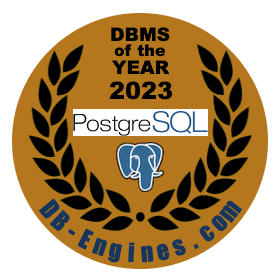Blog > Post
PostgreSQL is the DBMS of the Year 2023
von Matthias Gelbmann, Paul Andlinger, 2. Januar 2024
Tags:
For determining the DBMS of the year, we subtracted the popularity scores of January 2023 from the latest scores of January 2024. We use the difference of these numbers, rather than a percentage, because that would favor systems with a tiny popularity at the beginning of the year. The result is a list of DBMSs sorted by how much they managed to increase their popularity in 2023, or in other words, how many additional people started to communicate about it in one of the ways we measure in our methodology, for example job offers, professional profile entries and citations on the web.
DBMS of the Year: PostgreSQL

PostgreSQL is our DBMS of the Year for the fourth time, after winning already three titles between 2017 and 2020. Almost 35 years ago, Postgres, as it was called back then, was initially released. Quite a lot has changed since then, and this is actually the big success factor of PostgreSQL: a high pace of steady improvements, that keep the system at the forefront of DBMS technology, while providing a reliable and stable platform at the same time. PostgreSQL 16, released in September 2023, saw further performance improvements and more replication options among others. All of that makes PostgreSQL one of the most successful open source projects ever.
Runner-up: Databricks
Databricks is a cloud-based platform for big data analytics and machine learning, that was founded by the creators of Apache Spark. Databricks operates in an ecosystem around open source tools, that the company created or supports. This includes Apache Spark, but also Delta Lake, an open-source storage framework, Delta Sharing, an open protocol for secure data sharing, and MLflow, an open source platform for machine learning.
Databricks stays at rank 17 in our ranking, up from rank 19 one year ago.
Third place: Google BigQuery
BigQuery is Google's fully-managed cloud-based data warehouse and analytics platform. It is designed to handle and analyze large datasets using SQL queries. Besides the usual benefits of serverless computing, it comes with built-in machine learning and BI capabilities. BigQuery is part of the Google Cloud Platform (GCP) suite of cloud computing services.
BigQuery stays at rank 19 in our ranking, up from rank 21 one year ago..
We congratulate PostgreSQL, Databricks and Google on their success in 2023.
Previous winners of the DB-Engines DBMS of the Year Award:
| PostgreSQL | 2023 |
| Snowflake | 2022 |
| Snowflake | 2021 |
| PostgreSQL | 2020 |
| MySQL | 2019 |
| PostgreSQL | 2018 |
| PostgreSQL | 2017 |
| Microsoft SQL Server | 2016 |
| Oracle | 2015 |
| MongoDB | 2014 |
| MongoDB | 2013 |
Teilen sie diese Seite mit ihrem Netzwerk

 RSS Feed
RSS Feed


